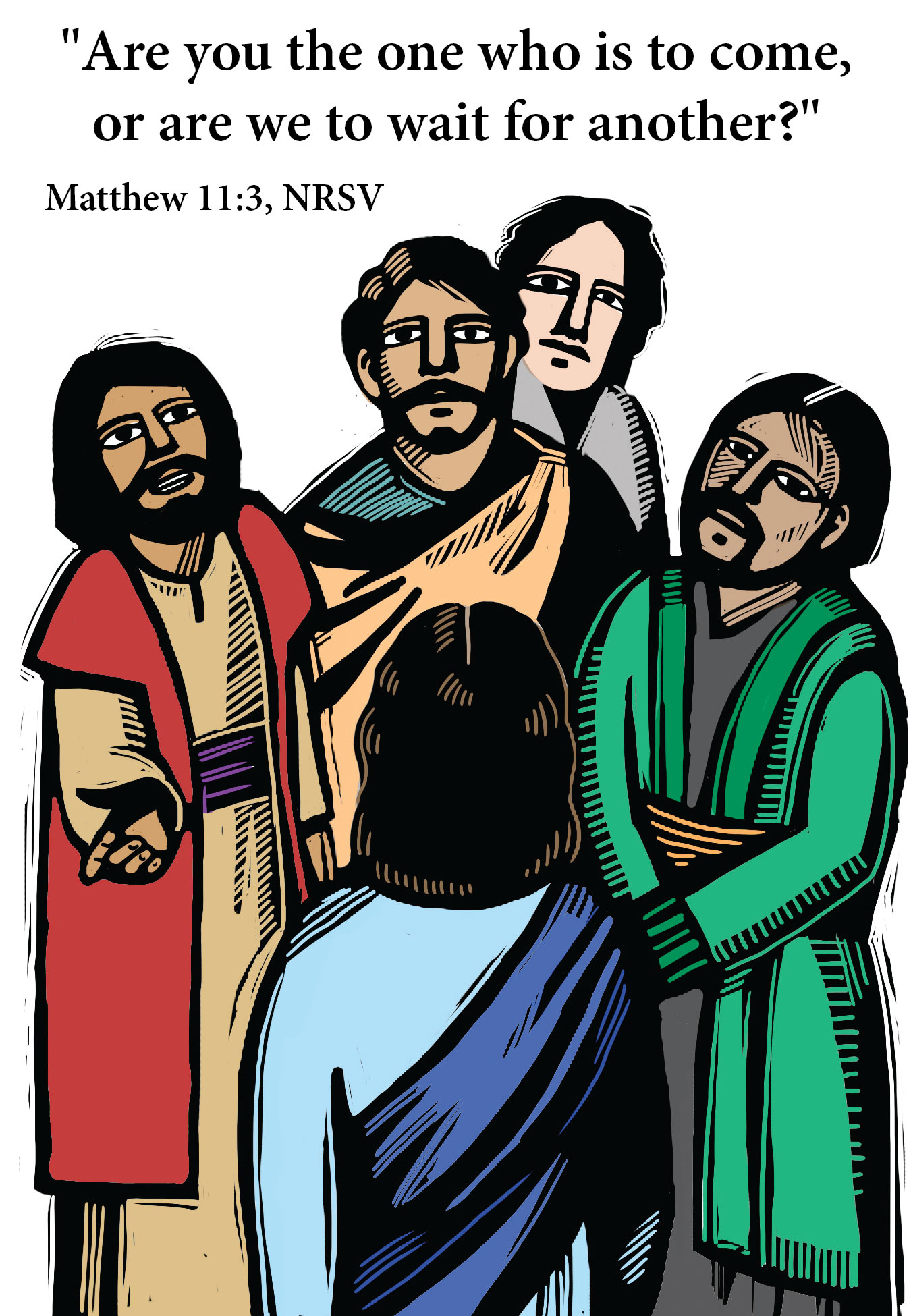Advent 3

Our Gospel has a pretty surprising question being asked by John the Baptist. John, who baptized Jesus and seemed pretty confident that Jesus was the one they were expecting, was now sending his followers to ask if Jesus is the one they were expecting. Why is John suddenly doubting?
There might be a few reasons for John’s doubt. One is that John has been thrown into prison. It is probably normal to be full of doubt while locked away in prison.
Another reason may be that Jesus wasn’t behaving in expected ways. His disciples weren’t following a strict habit of fasting the way John’s disciples and the Pharisees did. Jesus also kept questionable company. He gained a reputation for hanging out with tax collectors and other sinners. He was called a glutton and a drunk. This was not the expected behavior of the messiah.
The other reason for his doubt might have to do with what he thought the mission of the messiah was. The Messiah was to bring judgement, then blessing and healing for God’s people. John might rightful be asking “where is the judgement?” “where is the army?” “If wrongs are being set right, why is John still in jail?” “Why hasn’t Herod been dealt with yet?” “The messiah is the true king and Herod is still sitting on the throne”. These are the kinds of thoughts that might reasonably be going through John’s mind.
John might be expecting Jesus to act like Elijah before the prophets of Baal. He challenges them to a face to face showdown before the people of Israel.
Jesus seemed to be rewriting some of what was expected. In answer to John’s question Jesus replies by referring to Isaiah 35. The expectation was that there would be a judgement, then there would be blessing and healing. But Jesus seemed to be coming with the blessing and healing. Jesus says that the fruit of his ministry is “the blind receive their sight and the lame walk, lepers are cleansed and the deaf hear, and the dead are raised up, and the poor have good news preached to them” (Matt 11:5). … Jesus doesn’t come out and say, “yes, I’m the messiah”. But, he does messianic things. He heals, he teaches on his own authority. He has chosen 12 disciples, which symbolizes the renewal of the 12 tribes of Israel. … This is the true calling of the messiah. To be a blessing to God’s people.
The expectation was that after the judgement, God’s people would truly be set free. They were set free when they were rescued from slavery in Egypt, but their grumbling and continuous disobedience over the years showed that their souls continued to be enslaved. Jesus, in his first coming, brings blessing, healing, and freedom. … His second coming will be about judgement. He seems to have changed the expected order of things.
Judgement is good too. It is through judgement that we can determine what change is needed. Judgement puts its finger on the thing that we think is a blessing, but is actually a curse. It is the thing that is holding us back.
Jesus goes on to talk to talk about John the Baptist, and (through him) he also is talking about who he is. He has to be careful though because if he comes right out and says, “I am the messiah, the true king” and King Herod gets wind of that statement, his ministry might be cut short and he might find himself locked away with John … or worse.
Jesus says, “What did you go out into the wilderness to see? A reed shaken by the wind? What then did you go out to see? A man dressed in soft clothing? Behold, those who wear soft clothing are in kings' houses” Jesus might be referring to Herod here. The reed was the symbol of Herod Antipas. It was the symbol on his coins. Jesus speaks about soft clothes and king’s houses. He is juxtaposing John and Herod. Jesus goes on, “What then did you go out to see? A prophet? Yes, I tell you, and more than a prophet. … Truly, I say to you, among those born of women there has arisen no one greater than John the Baptist. Yet the one who is least in the kingdom of heaven is greater than he.”
Bishop NT Wright uses an interesting illustration to explain what Jesus is saying about John. He imagines John as the best horse drawn carriage maker in the world. … But, with the coming of the automobile the time for that kind of work is coming to an end. The lowest position on the totem pole in the factory making cars will still be at work, while the best and most talented horse drawn carriage makers will be out of work. … Jesus isn’t saying John is a failure. Actually John is a success. John and all the prophets before him were building to this time when things would change. John has prepared the way for the new thing. From Abraham and Moses until the present was a preparation. The new reality is now here. And the least, who accepts God’s kingdom and lives in it by following Jesus, they are a part of that new reality.
John was the greatest because he had a very special calling (Malachi 3:1). He was the last prophet. He was there for the overlap of the old to the new.
If John is that prophet, who prepares the way, then that implies that he is the messiah. Jesus also seems to want people to figure it out. He doesn’t seem to want to force himself on people.
Comments
Post a Comment